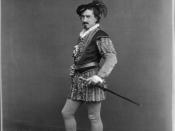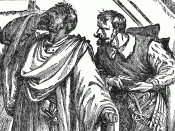In the play "Othello" by William Shakespeare, the behavior of Iago was important as his character explored acts of manipulation, his flexibility of acting different roles in many situations at the same time being able to adapt this tone and style to suit any occasion, and more importantly his professional jealousy. All these behaviors were important in the play as it demonstrated to the audience the consequences of trusting people and in addiction the pure jealousy which ultimately destroyed Othello, and ironically Iago too. Iago's behavior contributed especially to the downfall of Othello in which Iago succeeded in destroying a marriage, and two noble characters, as well as himself.
In the beginning of the play, during Act 1 Scene 1, Iago is portrayed as a particularly jealous man and reveals his deep resentment toward Othello as Iago believed that he would be promoted to the rank of Othello's first lieutenant; instead it was given to Cassio. "I follow him to serve my time upon him,/We cannot all be masters, nor all masters/ Cannot be truly followed." This quote shows that Iago has no respect for Othello beyond what he has to show to add to his own revenge. In addition it shows his resentment towards Cassio being preferred over him which has made him angry, perhaps in part because he has lost some part of his reputation and feels that he has been made to look foolish.
Iago's first act of revenge is quickly started when he tells Roderigo to alert Desdemona's father so that they can "poison his delight." Although Roderigo obeys, Iago is not satisfied so he starts shouting particularly coarse insults on Othello and tries to play on the senator's fears. He calls Othello an "old black ram," referring to the fact that Othello...
![From the Library of Congress: TITLE: Thos. W. Keene. Othello CALL NUMBER: POS - TH - 1884 .O7, no. 1 (C size) [P&P] REPRODUCTION NUMBER: LC-USZC6-58 (color film copy transparency) RIGHTS INFORMATION: No known restrictions on publication. MEDIUM: 1 print (](https://s.writework.com/uploads/9/94760/library-congress-title-thos-w-keene-othello-call-number-pos-thumb.jpg)

